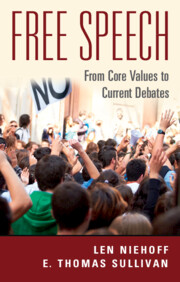Book contents
- Free Speech
- Free Speech
- Copyright page
- Dedication
- Contents
- Acknowledgments
- Introduction
- Part I Core Values
- Part II History
- 5 The First Amendment Prior to 1919
- 6 The First Amendment from 1919 to 1963
- 7 The First Amendment from 1964 to the Present
- 8 The First Amendment from 1964 to the Present
- Part III Basic Principles
- Part IV Current Controversies
- Conclusion
- Index
8 - The First Amendment from 1964 to the Present
Hard Cases
from Part II - History
Published online by Cambridge University Press: 30 April 2022
- Free Speech
- Free Speech
- Copyright page
- Dedication
- Contents
- Acknowledgments
- Introduction
- Part I Core Values
- Part II History
- 5 The First Amendment Prior to 1919
- 6 The First Amendment from 1919 to 1963
- 7 The First Amendment from 1964 to the Present
- 8 The First Amendment from 1964 to the Present
- Part III Basic Principles
- Part IV Current Controversies
- Conclusion
- Index
Summary
The Court’s increasingly categorical approach to First Amendment doctrine created a conceptual tool box: use this analysis for defamation, that one for obscenity; use this analysis for a content-based regulation, that one for a content-neutral time, place, and manner restriction; use this analysis for a traditional public forum, that one for a nonpublic forum; use this analysis for a prior restraint, that one for a subsequent punishment; and so on. In general, this approach yielded fairly clear guidance, although reasonable people can disagree about the merits of the results. Along the way, however, the Court encountered some hard cases that called for their own distinctive approaches.
- Type
- Chapter
- Information
- Free SpeechFrom Core Values to Current Debates, pp. 86 - 102Publisher: Cambridge University PressPrint publication year: 2022



